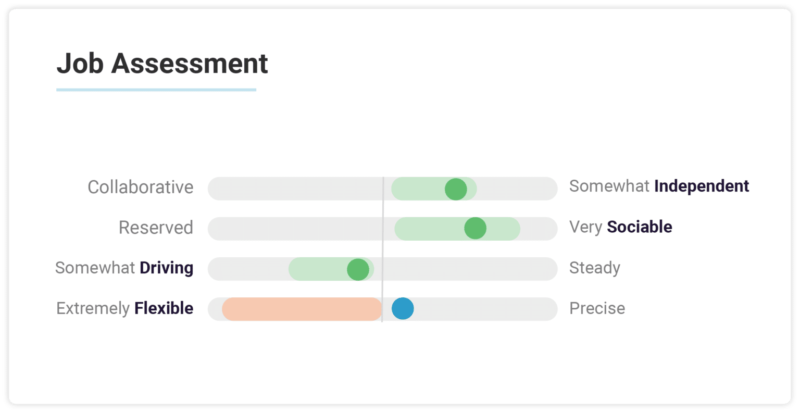How Talent Management Systems Revolutionize Employee Retention
By PSC Admin |
12.4 min read
Understanding Talent Management Systems
Talent management systems (TMS) are comprehensive platforms designed to optimize various aspects of human resources, from recruitment to employee development. These systems streamline and enhance the entire employee lifecycle, ensuring organizations can attract, retain, and develop top talent efficiently.
At Predictive Success, we integrate advanced tools and methodologies within our talent management systems to help businesses achieve their goals. Our approach includes the Predictive Index (PI) Behavioral Assessment™, PI Cognitive Assessment™, and PI Job Assessment™, which collectively offer deep insights into employee behavior, cognitive abilities, and job fit. These tools enable organizations to make informed decisions about hiring, team design, and leadership development.
Key features of our TMS include
- Recruitment: Utilizing behavioral and cognitive assessments to identify candidates who align with the organization’s culture and job requirements.
- Onboarding: Streamlined processes that ensure new hires are effectively integrated into the company.
- Performance Management: Continuous tracking and feedback mechanisms to monitor employee performance and provide timely development opportunities.
- Employee Development: Personalized growth plans and training programs to foster employee skills and career advancement.
By leveraging these features, organizations can build a workforce that is not only skilled and competent but also engaged and motivated, leading to higher retention rates and overall business success.
The Importance of Employee Retention

High employee turnover is a significant challenge for many organizations, leading to increased recruitment costs, lost productivity, and disruption of team dynamics. Retaining top talent is crucial for maintaining business continuity, preserving institutional knowledge, and fostering a positive workplace culture.
The financial impact of high turnover can be staggering. Costs associated with recruiting, training, and onboarding new employees can quickly add up, not to mention the loss of expertise and the negative effect on team morale. According to industry research, replacing an employee can cost anywhere from 50% to 200% of their annual salary.
On the other hand, retaining employees offers numerous benefits. Long-term employees develop a deep understanding of the company’s processes, products, and clients, contributing to increased efficiency and better service delivery. Moreover, high retention rates are often associated with higher employee satisfaction and engagement, which are critical for fostering a positive work environment.
Statistics show that companies with high retention rates outperform their peers in terms of productivity, profitability, and customer satisfaction. Investing in effective talent management systems, such as those offered by Predictive Success, is essential for creating a stable and committed workforce that drives business success.
Talent Management Systems and Recruitment

Recruiting the right talent is the first step towards building a high-performing team and ensuring long-term employee retention. Advanced recruitment tools, integrated within talent management systems, play a crucial role in identifying candidates who not only possess the necessary skills but also fit well with the company’s culture.
Predictive Success employs a comprehensive approach to recruitment through our PI Behavioral Assessment™, PI Cognitive Assessment™, and PI Job Assessment™. These tools provide a detailed understanding of a candidate’s personality traits, cognitive abilities, and suitability for specific roles. By leveraging these assessments, organizations can make data-driven decisions that significantly reduce the risk of bad hires.
The PI Behavioral Assessment™ evaluates candidates based on four key behavioral drives: dominance, extraversion, patience, and formality. Understanding these drives helps predict how individuals will behave in the workplace, ensuring they are a good fit for the company culture and job requirements.
The PI Cognitive Assessment™ measures the speed at which candidates can learn and process information, which is critical for roles that require quick thinking and adaptability.
The PI Job Assessment™ helps define the ideal candidate profile for a specific role, aligning hiring criteria with business needs. This holistic approach to recruitment ensures that organizations hire candidates who are not only capable but also likely to stay and thrive within the company.
By utilizing these advanced recruitment tools, organizations can improve their hiring process, reduce turnover rates, and build a strong foundation for employee retention.
Enhancing Onboarding Processes

Effective onboarding is crucial for employee retention as it sets the tone for a new hire’s experience within the company. A well-structured onboarding process ensures that new employees feel welcomed, supported, and prepared to contribute to their roles from day one.
Predictive Success offers tailored onboarding solutions that streamline the integration of new hires into the company. Our onboarding tools are designed to provide a comprehensive introduction to the company culture, values, and expectations, ensuring that new employees are aligned with the organizational goals from the start.
One key aspect of our onboarding process is the use of the PI Behavioral Assessment™ and PI Cognitive Assessment™ results to create personalized onboarding plans. By understanding the unique strengths and development areas of each new hire, managers can tailor their onboarding approach to meet individual needs. This personalized attention helps new employees feel valued and supported, increasing their likelihood of staying with the company long-term.
Additionally, our onboarding tools include interactive training modules, regular check-ins, and feedback mechanisms to monitor progress and address any challenges that new hires may encounter. These elements ensure that new employees receive the necessary training and support to succeed in their roles.
Effective onboarding not only enhances employee retention but also boosts productivity and engagement. By investing in a robust onboarding process, organizations can set their new hires up for success, creating a positive and lasting first impression.
Performance Management and Employee Development

Continuous performance management and employee development are essential components of a successful talent management strategy. These practices ensure that employees receive regular feedback, recognition, and opportunities for growth, which are critical for maintaining high levels of engagement and retention.
At Predictive Success, we offer a range of tools and methodologies to support performance management and employee development. Our approach includes continuous performance tracking, personalized development plans, and targeted training programs.
Continuous performance tracking involves regular assessments and feedback sessions to monitor employee progress and identify areas for improvement. By providing timely and constructive feedback, managers can help employees stay on track and achieve their goals. This ongoing communication fosters a culture of transparency and accountability, which is essential for employee satisfaction and retention.
Personalized development plans are another key aspect of our performance management approach. Based on the insights gained from the PI Behavioral Assessment™ and PI Cognitive Assessment™, managers can create tailored development plans that align with each employee’s strengths and career aspirations. These plans include specific goals, training opportunities, and milestones to guide employees on their career paths.
Our training programs are designed to address the unique needs of each employee, providing them with the skills and knowledge required to excel in their roles. We offer a variety of training modules, from leadership development to technical skills training, ensuring that employees have access to the resources they need to grow and succeed.
Investing in employee development not only enhances retention but also boosts overall organizational performance. Employees who feel supported in their professional growth are more likely to be engaged, motivated, and committed to the company. By implementing a comprehensive performance management and development strategy, organizations can create a culture of continuous improvement and high performance.
Building a Positive Workplace Culture

A positive workplace culture is a cornerstone of employee retention. When employees feel valued, respected, and engaged, they are more likely to stay with the company and contribute to its success. Building such a culture requires intentional effort and the right tools to diagnose and enhance employee engagement.
At Predictive Success, we offer a range of solutions to help organizations foster a positive and inclusive workplace culture. Our approach includes the PI Employee Experience Survey, Employee Experience Coaching, and the LEAP platform, all designed to provide data-driven insights into employee engagement and satisfaction.
The PI Employee Experience Survey is a comprehensive tool that measures various aspects of employee engagement, including job satisfaction, team dynamics, and organizational culture. By regularly conducting these surveys, organizations can identify areas of strength and areas needing improvement, allowing them to take targeted actions to enhance the employee experience.
Employee Experience Coaching provides managers with the skills and knowledge needed to create a supportive and motivating work environment. Our coaching programs focus on improving communication, fostering teamwork, and developing effective leadership practices. These programs help managers build strong relationships with their teams, which is crucial for maintaining high levels of engagement and retention.
The LEAP platform is a powerful tool that integrates data from various sources to provide a holistic view of employee engagement. This platform enables organizations to track engagement trends, identify potential issues, and implement effective strategies to address them. By leveraging data-driven insights, organizations can create a positive workplace culture that supports employee well-being and performance.
Building a positive workplace culture is an ongoing process that requires commitment and the right tools. By investing in employee engagement and fostering a supportive work environment, organizations can enhance retention and create a thriving workplace.
Data-Driven Decision Making
Data-driven decision-making is essential for effective talent management and employee retention. By leveraging data analytics, organizations can gain valuable insights into their workforce, enabling them to make informed decisions that enhance employee satisfaction and retention.
Predictive Success offers advanced data analytics tools that empower organizations to make data-driven decisions. Our LEAP platform integrates data from various sources, providing a comprehensive view of employee engagement, performance, and development. This platform enables HR professionals and managers to track key metrics, identify trends, and implement strategies to improve employee retention.
One of the key benefits of data-driven decision-making is the ability to identify and address potential issues before they escalate. By monitoring engagement and performance data, organizations can detect early signs of dissatisfaction or disengagement and take proactive measures to address them. This proactive approach helps prevent turnover and ensures that employees feel valued and supported.
Data analytics also enable organizations to personalize their talent management strategies. By understanding the unique needs and preferences of each employee, managers can create customized development plans, provide targeted training, and offer personalized support. This personalized approach enhances employee satisfaction and increases the likelihood of retention.
Moreover, data-driven decision-making helps organizations measure the impact of their talent management initiatives. By tracking key performance indicators (KPIs) such as turnover rates, employee engagement scores, and performance metrics, organizations can evaluate the effectiveness of their strategies and make necessary adjustments. This continuous improvement process ensures that talent management efforts are aligned with organizational goals and deliver optimal results.
Overall, the integration of data analytics into talent management practices allows organizations to make informed, strategic decisions that significantly enhance employee retention. At Predictive Success, we are committed to providing the tools and insights needed to harness the power of data for better talent management outcomes.
Measuring the Impact of Talent Management Systems

Measuring the impact of talent management systems is crucial for understanding their effectiveness and ensuring continuous improvement. Key performance indicators (KPIs) provide valuable insights into how well these systems are working and highlight areas for potential enhancement.
At Predictive Success, we use a range of metrics to evaluate the success of our talent management systems. These include employee turnover rates, engagement scores, performance metrics, and feedback from employee surveys. By analyzing these data points, we can determine the impact of our talent management strategies on employee retention and overall organizational performance.
Turnover rates are a primary indicator of retention success. A decrease in turnover rates signifies that employees are more satisfied and engaged, which is often the result of effective talent management practices. Additionally, employee engagement scores, derived from regular surveys, provide insights into how motivated and committed employees are to their work and the organization.
Performance metrics, such as productivity levels and goal attainment, also offer a clear picture of the effectiveness of talent management systems. High performance often correlates with strong employee engagement and satisfaction, indicating that the talent management strategies in place are successful.
Feedback from employee surveys is invaluable for identifying specific areas that may need improvement. This feedback helps organizations understand the employee experience and make data-driven adjustments to their talent management practices.
By continuously monitoring these KPIs, organizations can ensure that their talent management systems are delivering the desired outcomes. At Predictive Success, we are dedicated to helping organizations measure and enhance the impact of their talent management efforts to achieve optimal business results.
Conclusion: Talent Management Systems
Talent management systems play a pivotal role in revolutionizing employee retention. By integrating advanced tools and methodologies, such as those offered by Predictive Success, organizations can effectively manage the entire employee lifecycle, from recruitment to development.
Understanding the components and benefits of talent management systems is crucial for modern businesses aiming to reduce turnover rates and enhance employee satisfaction. Effective recruitment processes ensure the right fit from the start, while robust onboarding programs set new hires up for success. Continuous performance management and personalized development plans keep employees engaged and motivated, fostering a positive workplace culture.
Data-driven decision-making further enhances the effectiveness of talent management strategies. By leveraging data analytics, organizations can make informed decisions that address potential issues early, personalize talent management efforts, and measure the impact of their initiatives. This proactive approach not only improves retention but also boosts overall organizational performance.
At Predictive Success, we are committed to providing the tools and insights needed to harness the power of talent management systems. By aligning people strategies with business objectives, our solutions help organizations build a stable, committed, and high-performing workforce. Invest in a comprehensive talent management system today to revolutionize your employee retention and drive business success.
Empower your business with Predictive Success’s advanced talent management solutions to enhance employee retention and drive organizational success: Request a Demo
Further Reading
- How Learning and Development Can Attract and Retain Talent: This article highlights the importance of personalized learning and development (L&D) programs in attracting and retaining employees. It notes that skills training is highly valued by younger workers and can significantly impact employee retention and attraction. For instance, companies like Sam’s Club have maintained full employment by focusing on employee development. The article underscores the competitive advantage of offering robust L&D programs to keep top talent satisfied and engaged.
- Internal Recruitment Critical to Hiring, Retention: This article discusses the benefits of strong internal mobility programs for hiring and retaining top talent. It explains that promoting from within can lead to better performance and higher employee engagement. Companies with effective internal recruitment programs can reduce time-to-productivity and costs associated with external hiring. The article emphasizes that internal mobility is a key strategy for improving retention and making organizations more competitive globally.
Related Blogs
The Year-End Talent Playbook: Setting Your Workforce Up for Success in 2025
Success in 2025 starts with the decisions you make today. The workforce landscape is rapidly evolving, and organizations must be proactive in aligning their talent strategies with future business goals. The year-end period offers an
Innovative Hiring Tools: Transforming Your Recruitment Process
Recruitment is no longer just about filling open positions; it’s about finding the right people whose skills and personalities align with both the demands of the role and the culture of the organization. Traditional hiring
Coaching and Development Tools Every Manager Needs
The Importance of Coaching and Development in the Workplace Coaching and development are essential to business success, improving both team performance and individual employee growth. Effective coaching drives talent optimization, aligns team goals, and creates


